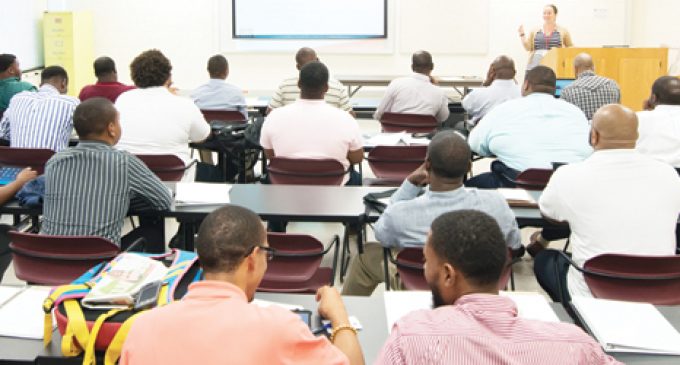Black Men Prepare for Challenges of the Classroom

The HBCU (Historically Black Colleges and Universities) Male Summer Institute was held on the campus of Winston-Salem State University from July 27 – Aug. 2, attracting 30 aspiring teachers from schools across the nation.
Part of the Thurgood Marshall College Fund Teacher Quality and Retention Program, theInstitute challenges the dearth of black male teachers by giving participants support and the tools they need to succeed in the classroom. Workshops and lectures focus on teaching innovations and relevant subjects like professional development and school violence.
The Washington, D.C.-based Thurgood Marshall College Fund started the Institute six years ago, according to its vice president, Misha Lesley. She said it became clear then that something needed to be done to not only improve the quality of teachers but retention rates for educators as well.
“We wanted to ensure that teachers who go into classrooms stay and impact students positively,” Lesley said. “Research suggests that when students are able to identify with their teachers, they will do better in school. There is also a great need for diversity. It is better for our school systems if the teachers reflect our communities.”
HBCUs are ground zero in this fight. Statistics show more minority teachers come from

Emmanuel Robinson (left) from Langston University works with Brandon Davis of Albany State University.
HBCUs than non-HBCUs. WSSU, which collaborated with the Thurgood Marshall College Fund and Wells Fargo to host the Institute, even has its own support program for aspiring male educators – Real Men Teach.
Dawn Tafari, a clinical faculty member in WSSU’s Department of Education, believes there is a direct link between the lack of black male teachers and the high rate of suspensions and expulsions of black male students.
“There is this cultural disconnect happening,” she said. “We can’t ignore the fact that the majority of public school teachers are middle-class white women, while the majority of children who are undergoing this kind of maltreatment and misfortune are black boys. I think one of the ways to rectify that is through culturally relevant instruction. Black boys need to see themselves in schools, they need to see black men who are successful and see that schoolis a place for them.”
Tafari said black men leading classes will spur the next generation of black teachers.
“We are letting them see that they can achieve and strive academically, instead of being a basketball player or a rapper,” she said.
Dominique Wilder, a student at Oklahoma’s Langston University, wants to teach middle or high school science. He has participated in the HBCU Male Summer Institute in the past. He says the program is beneficial.
“This is a good networking experience. I have met a couple people that I have stayed in touch with from the last program,” Wilder said. “I like the atmosphere, and the tools that they give help me to become an effective teacher.”
Jonathan Hood, a student at Alcorn State University in Mississippi who hopes to one day teach music, said the hands-on experience and helpful tools he and the other men received will take them far.
“This is great information that we are learning now so that when we get into a classroom we will be ready to handle those things,” Hood said. “I have learned a couple of strategies that I will be using.”
But getting men like Wilder and Hood graduated and in classrooms is only part of the challenge. Lesley says teacher turnover is a big issue. Fifty percent of teachers who leave the classroom, do it during their first three to five years. Many, she said, leave because they say they were unprepared for the rigors of teaching and/or lacked mentoring and support. The Institute is designed so that participants can avoid such pitfalls and challenges, Lesley said.


















